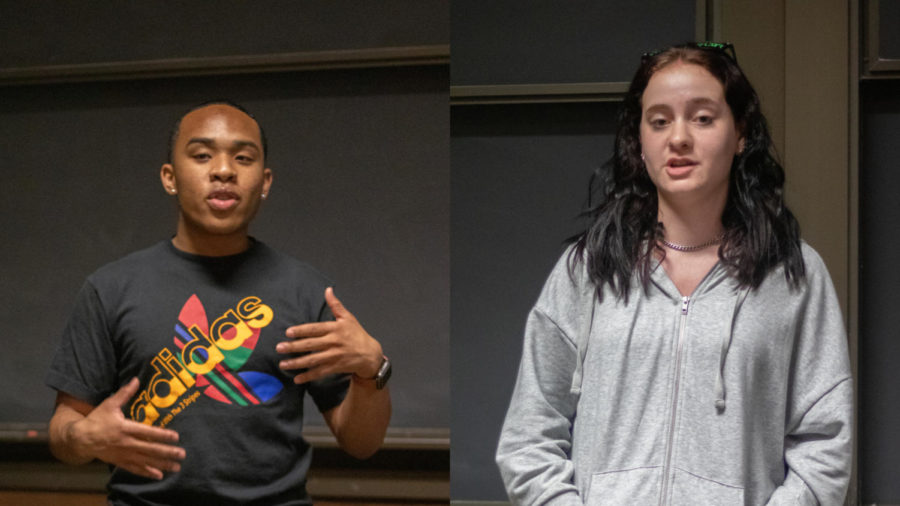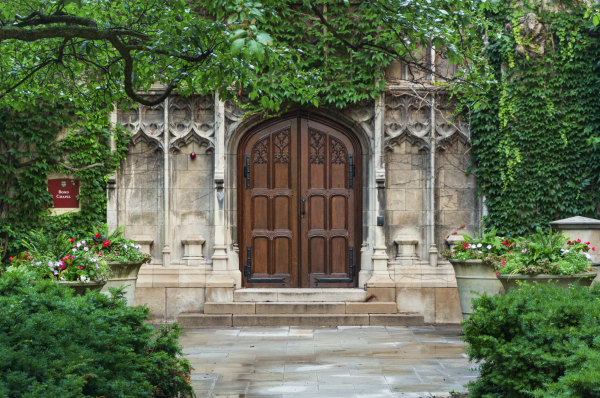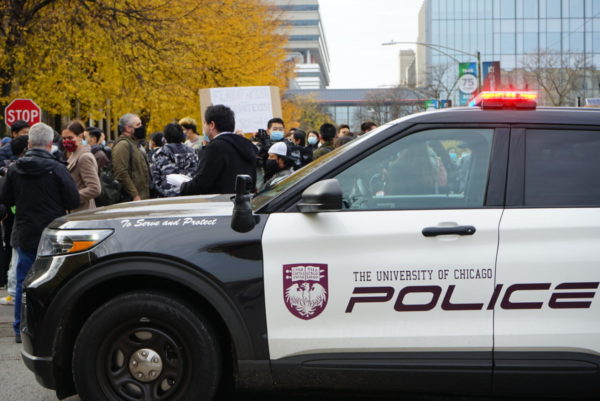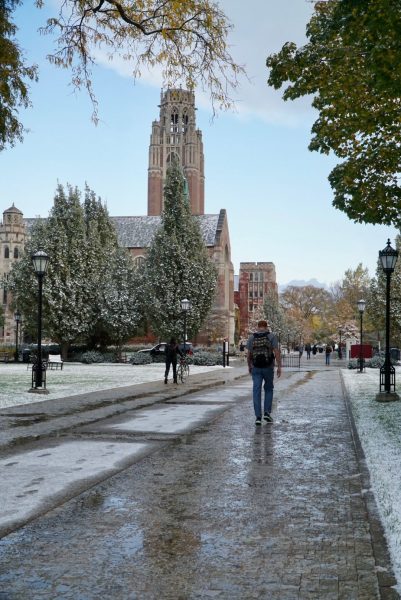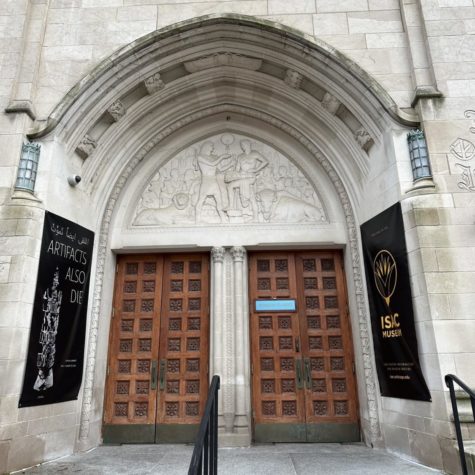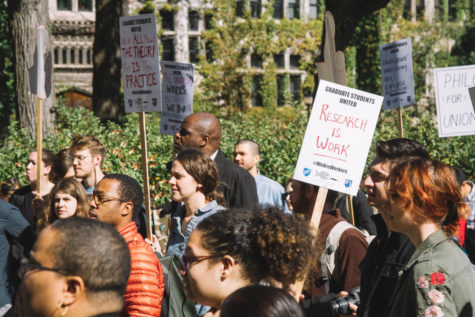2023 USG Endorsement: Uplift Marginalized Voices by Voting for upLIFT Slate
The Maroon Editorial Board endorses upLIFT for Undergraduate Student Government’s executive slate, Jackson Lee for trustee and faculty governance liaison, and Nina Hafner for vice president of campus life.
Elijah Jenkins and Julia Brestovitskiy of upLIFT Slate
April 12, 2023
Every spring, The Maroon invites candidates running for executive roles within Undergraduate Student Government (USG) to sit down for interviews with The Maroon Editorial Board. All of the 2023 candidates interviewed by the Editorial Board demonstrated a strong commitment to improving the College. Regardless of the outcome of the election, we hope that they all continue to push for the implementation of their ideas.
We also welcome the first competitive elections for USG’s executive slate since 2020. All three of the executive slates on the ballot emphasized that two consecutive uncontested races for slate have accompanied broad disillusionment and reduced engagement with USG among the student body. We hope that the vigorous debate inherent to a competitive election will drive up student participation.
Those elected to run USG significantly affect the experiences of UChicago’s 7,011 undergraduate students. It is crucial for students not just to vote in this week’s election but also to hold our elected representatives accountable. Scrutiny and engagement ensure transparent and effective governance.
While we, as the Editorial Board, have endorsed certain candidates, we encourage all voters to reflect on what they value in a candidate and cast informed votes before polls close at 4 p.m. on Friday, April 14.
Editor’s note: The Maroon has chosen not to endorse candidates for vice president of student affairs and vice president for advocacy. Class of 2026 College Council (CC) representatives Meera Dasgupta and Timothy Lu, the sole candidates for each respective position, were not able to meet with the board.
Executive Slate: upLIFT
From among the three executive slates on the ballot in the spring 2023 election, the Maroon Editorial Board endorses upLIFT consisting of third-year Julia Brestovitskiy as president and first-year Elijah Jenkins as executive vice president (EVP).
The LIFT in upLIFT stands for listening, internalizing, focusing, and transforming and represents Brestovitskiy and Jenkins’s emphasis on creating sustainable, concrete change within USG and on campus. The pair emphasized their commitment to representing those whose voices they believe have not been heard by USG. As first-generation, low-income (FGLI) students and Odyssey Scholars, Brestovitskiy and Jenkins draw on their personal experiences in their platform, which focuses on matching FGLI, ethnic and cultural, environmental, and advocacy RSOs with the appropriate USG committees.
Brestovitskiy, USG’s VP of student affairs, and Jenkins, a first-year CC representative, have spearheaded a vast array of initiatives as USG members, preparing them well for their respective roles should they win the election. As a first-year CC representative, Brestovitskiy pushed for USG’s split from Graduate Council; she then chaired the Academic and Career Affairs Committee and later, in her capacity as community and government liaison, helped obtain and distribute 20,000 KN95 masks in January 2022 through the USG community service fund. Jenkins has worked to offer undergraduates online language classes in Yoruba, Twi, and Igbo, which have previously only been available for graduate students. Next, Jenkins plans to work with administrators at the Center for Identity and Inclusion and the Department of Race, Diaspora, and Indigeneity to expand and diversify humanities curricula. Brestovitskiy’s experience on the administrative and policy sides of USG allied with Jenkins’s clear enthusiasm and consistent presence at USG tabling this year make the pair a compelling slate with a record that portends success.
Despite each member’s strong track record, neither one has served in a role with as much administrative responsibility as those on the executive slate. And while Brestovitskiy has chaired CC committees and most recently served as the vice president of student affairs, Jenkins has only had one year at the College, one he did not spend in a leadership position within USG.
This lack of experience disadvantages them relative to the Golden Slate Warriors, which features current USG EVP Jefferson Lind as its presidential candidate and vice president of advocacy Ariana Ukaonu as EVP. Lind and Ukaonu demonstrated excellent institutional knowledge and outlined multiple approaches to resolving the ongoing debates between students and administration about divestment, quarter length, and funding for student activities. However, we felt that their platform lacked the cohesion and unified vision of the upLIFT slate.
The third slate on the ballot is Chicago for U, comprising second-year Ben Vacher for president and third-year Alex Norton for EVP, neither of whom have been on USG before. The board, though wary of their lack of experience, was heartened by the motivation shown by Vacher and Norton in a race in which they are likely to be the underdogs. Their primary goals—returning to a one-year housing requirement and ensuring that meal plans carry over from one quarter to the next—are likely too lofty to accomplish in one year, particularly considering their limited knowledge of how to put their plans into action. But their calls to improve USG’s accessibility to the general student population resonated strongly with the Editorial Board, and their interest in reshaping RSO funding models shows that they have already begun to penetrate the USG bubble.
Overall, it’s hard to top Brestovitskiy and Jenkins’s combination of structural knowledge and aspiration for change. Throughout their tenures in USG, both have demonstrated a unique ability to not only identify relevant issues on campus but also take actionable, meaningful steps to address them. There’s every reason to think they’d continue that pattern if upLIFT wins the election.
Solana Adedokun recused herself from this editorial because of a personal relationship with Ukaonu.
Trustee and Faculty Governance Liaison: Jackson Lee
The board endorses third-year Jackson Lee for trustee and faculty governance liaison. His emphasis on communication within and outside USG will give him a strong base for establishing himself in the role, but the board acknowledges that both his and fellow candidate Evelyn Li’s platforms had glaring gaps they must address before they take office.
Lee, who has not previously held a position in USG, told the board that he hoped to foster greater engagement between USG and the student body. Given his status as a newcomer, we were heartened by his emphasis on transparency, especially gathering input from students through frequent surveys—one of many signs of Lee’s humility that we observed in speaking with him. To improve that transparency, Lee aims to increase promotion of funding sources for student initiatives and to create a “self-starting” fund for prospective RSOs to get off the ground. His experience as president of UChicago Robotics, which he founded during his first year, shows both his commitment to supporting STEM initiatives on campus and his ability to see projects like the self-starting fund through to success.
The board also supported Lee’s plan to expand inquiry-based learning (IBL) beyond STEM courses, in which it has been in trial recently. Expanding student-guided learning across disciplines would not restructure the Core Curriculum completely but rather build on existing learning approaches at a time when newer sequences still have some room to be modified. No other candidate discussed IBL, illustrating why Lee’s outsider perspective would be especially beneficial when paired with either upLIFT or Golden Slate Warriors—both composed of existing USG members—as the executive slate ticket.
However, we fear that Lee’s visions are too idealistic to accomplish in USG’s current climate. If he is elected, Lee would enter a USG burdened by debates over funding for student events, decreasing the likelihood of securing additional sources of funding. Lee—and USG as a whole—must account for this potential hurdle with a more pragmatic approach to putting campaign goals into action, as he must do with his IBL expansion initiatives.
Most concerningly, Lee’s platform seemed not to capture the very essence of his role: nurturing relationships with faculty and trustees. Compared against Li’s deep understanding of internal USG dynamics from her two years as CC representative and vice president for campus life, Lee has little formal experience in negotiating with higher-ups at the university. The board hesitates to offer him a stronger endorsement given his lack of actionable plans for involving faculty and trustees in discussions, particularly about curricular reform.
Ultimately, Li’s narrow focus on improving drainage on the quad—which she has already tackled in her current capacity as VP for campus life—makes it difficult to envision other policy initiatives she could bring to the role. Despite its glaring omission of any environment-focused plans, Lee’s platform tackles a comparatively broader range of issues. We believe he deserves the chance to demonstrate his potential and democratize USG’s path of access through his presence as an outsider.
Nikhil Jaiswal recused himself from this editorial because of a personal relationship with Lee.
Vice President for Campus Life: Nina Hafner
The Editorial Board wholeheartedly endorses Nina Hafner for vice president of campus life, and we look forward to enjoying the varied lunch options and cheaper laundry services that will hopefully emerge from her tenure.
A third-year at the University and a current CC representative, Hafner, who is running unopposed, has two years of experience as a resident assistant (RA) and currently serves as chair of the Residence and Dining Life Committee, in which capacity she’s worked closely with Associate Vice President for Campus Life Richard Mason. Both in and outside of her RA capacity, Hafner noticed that residents felt housing could not meet their needs, particularly when it came to winter break housing. These observations inspired her to run for this position, and her ethos of transparency and accountability makes her an easy choice.
The primary points in Hafner’s platform include making requests for housing over break a smoother process; correcting for inaccuracies in dietary information of dining hall entrées; and restructuring the housing lottery, which locked several residents of Campus North Residential Commons out of their houses this year. Additionally, she’s passionate about introducing subsidized laundry and printing, particularly as a source of support for low-income students, as well as reforming the process by which first years are sorted into houses to emphasize improving retention and house culture. Hafner’s policy points demonstrate her deep understanding of and commitment to improving housing and dining, perhaps the most foundational elements of campus life.
Hafner also recognized that a large part of this role comes down to effectively communicating students’ needs to administrators, and her past experience shows that she can. For example, writing UTAP, a proposal for universal tap access policy that would allow students to tap into any dormitory building with their student IDs, taught her the value of surveys in making proposals to University administration. To translate student demands into workable administrative plans, she said she hopes to use her influence as a USG member to create committees and have more feet on the ground to help solicit student opinions.
The Editorial Board has little doubt that she’ll meet her goal.
Members of the Editorial Board active in these decisions: Solana Adedokun, Elena Eisenstadt, Cherie Fernandes, Nikhil Jaiswal, Michael McClure, Eva McCord, Naina Purushothaman, Kayla Rubenstein.


